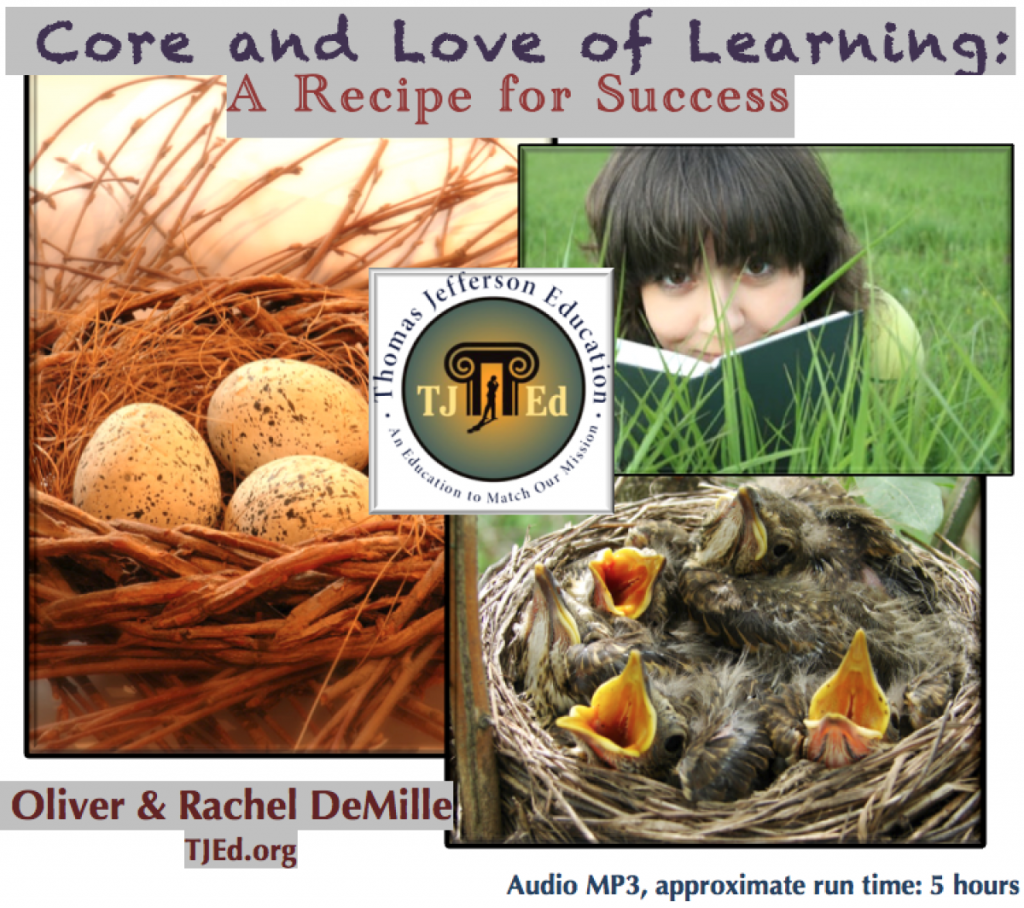“The Four Lost American Ideals”
 In this recorded speech, Oliver DeMille draws from intensive study of the Founding generation to identify five defining ideals of Americanism:
In this recorded speech, Oliver DeMille draws from intensive study of the Founding generation to identify five defining ideals of Americanism:
- Freedom
- Georgics
- Providence
- Liber
- Public Virtue
Although the first, freedom, has not yet been fully lost, it is steadily declining because of the loss of the other four. These four ideals permeated early American society but have largely been forgotten.
Georgics
The word “georgics” comes from the Greek “geo,” meaning earth, and “ergon,” meaning work. The literal translation, therefore, means to work, or farm the earth.
Translated to fit modern times, the essence of the word is “ownership.”
America was built on the backs of free and independent owners. The more owners we have, the more freedom we enjoy, and vice versa.
Providence
There are two aspects to the concept of providence: 1) there is a Higher Power, or God, and 2) God has a specific purpose — or mission — for every individual.
Those who believe in and submit to providence live virtuous and courageous lives of service and leave legacies. They work with passion and purpose. They live by design, rather than default.
Liber
“Liber” is a Latin word for tree bark. It’s also the root word of “library” and “liberty,” revealing the relationship between knowledge and freedom.
In the ancient world tree bark used to write on, and there were generally two groups of people: slaves and liber. To be “liber” meant that one could read, write and engage in contract.
Liber means much more than mere literacy — it means that you have the ability to think, learn and lead. It means being able to engage with the greatest thinkers, respond intelligently, and practically apply knowledge to improve the world.
Public Virtue
Public virtue means to voluntarily sacrifice personal benefit for the good of society.
Those who have lived the first three ideals (liberally educated owners engaged in personal mission) can apply public virtue to transform society when it matters most.
“The Freedom Crisis”
 Despite the best efforts of dedicated citizens, the freedom movement has been losing for ten decades.
Despite the best efforts of dedicated citizens, the freedom movement has been losing for ten decades.
Why is this, and how can we reverse this trend?
In this 53-minute recorded speech, Oliver DeMille provides surprising answers that challenge and stretch your thinking.
Freedom lovers are losing, says DeMille, because they’ve been trained to think sensus solum. This type of thinking stifles creativity, inhibits innovation, creates cultural rigidity, and fails to sway the thinking populace.
In order to conquer this ingrained challenge and win the battle for freedom, three things must occur:
- Widespread Sensus Plenior
- Successful Innovators Building Effective Mini-Factories
- Statesmen & Stateswomen
Unless we can accomplish these goals, freedom will be lost for future generations. Absorb this speech to learn what these mean and how you can contribute to the solutions.
Sensus Plenior
Sensus plenior, a Latin term, is the thought patterns and language of poetry, symbol, and celebrity.
Lower classes in America have been taught sensus solum, while upper classes have been taught sensus plenior. This has created a de facto aristocracy.
For freedom to win, America needs about 30 percent of the population to think in terms of sensus plenior.
Mini-Factory Owners
As Oliver DeMille wrote in The Coming Aristocracy:
A mini-factory is anything someone does alone or with partners or a team, that accomplishes what has historically been done en masse or by big institutions.
“Entrepreneurship, alternative education, the downshifter movement, environmental groups, alternative health, the growth of spirituality, community architecture, the explosion of network marketing, home doctor visits, the rebirth of active fathering, and so many other trends are mini-factories.”
Mini-factory owners — innovators, entrepreneurs — think differently than other segments of the population. They believe in freedom. They build things worth fighting for.
America needs at least 3 percent of the population to build successful mini-factories in order to revive, protect, and spread freedom.
Statesmen & Stateswomen
Statesmen have 1) a broad and deep understanding of governmental, societal, and familial forms that deepen and perpetuate freedom, and 2) the social capital and influence to implement those forms.
They possess the highest levels of education based upon a specific methodology. With a deep understanding of history, they see into the future, then create and implement forms in the present.
Core and Love of Learning Seminar Highlights
 “Core and Love of Learning: A Recipe for Success” is a 5-hour audio series consisting of highlights from a two-day seminar presented by Oliver and Rachel DeMille in 2007.
“Core and Love of Learning: A Recipe for Success” is a 5-hour audio series consisting of highlights from a two-day seminar presented by Oliver and Rachel DeMille in 2007.
This mp3 download will help you identify and expand your vision of how the TJEd model can work in your home. Oliver and Rachel’s spontaneous, candid, intimate, touching, humorous and profound commentary on Leadership Education in the home includes:
- Daily and Weekly Scheduling
- Organizing Space in your home to support Thomas Jefferson Education
- What to simplify and what to beef up
- What to say “No” to, and when to say “Yes”
- Music and other lessons and how to best integrate them
Highlights include:
- Which books work best for what ages
- Organizing a big family with students at different ages and Phases
- Separating discipline from academics
- Using outside activities without letting them take over
- Tips for making mornings work
This unique recording is informal, sensitive and interactive, as Rachel and Oliver share from the heart and dialog about how TJEd works in the home. While the content in this seminar is based on information published in Leadership Education: The Phases of Learning, these excerpts were specifically chosen for audio distribution because they are not available elsewhere in any format; this is a deeper and more detailed presentation with personal anecdotes and insights from one of the most successful TJEd seminars ever presented.











